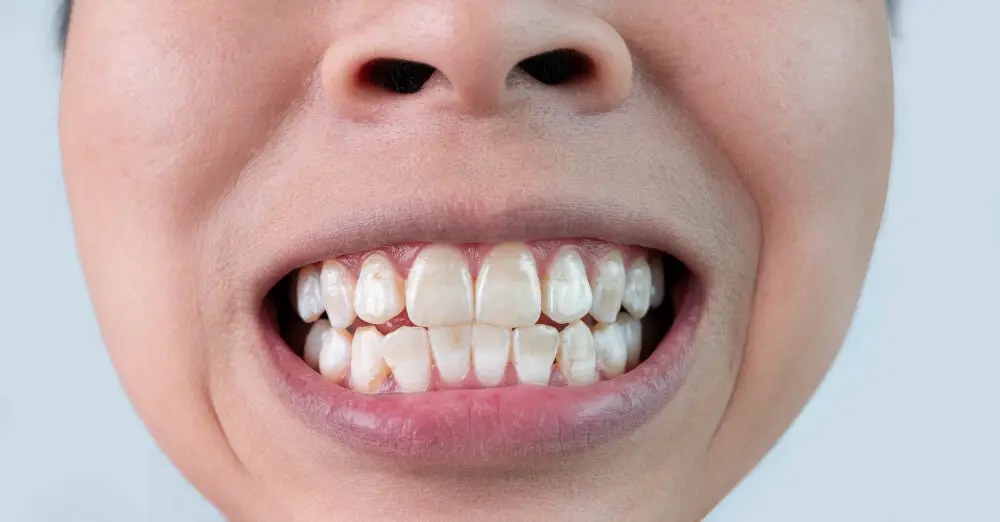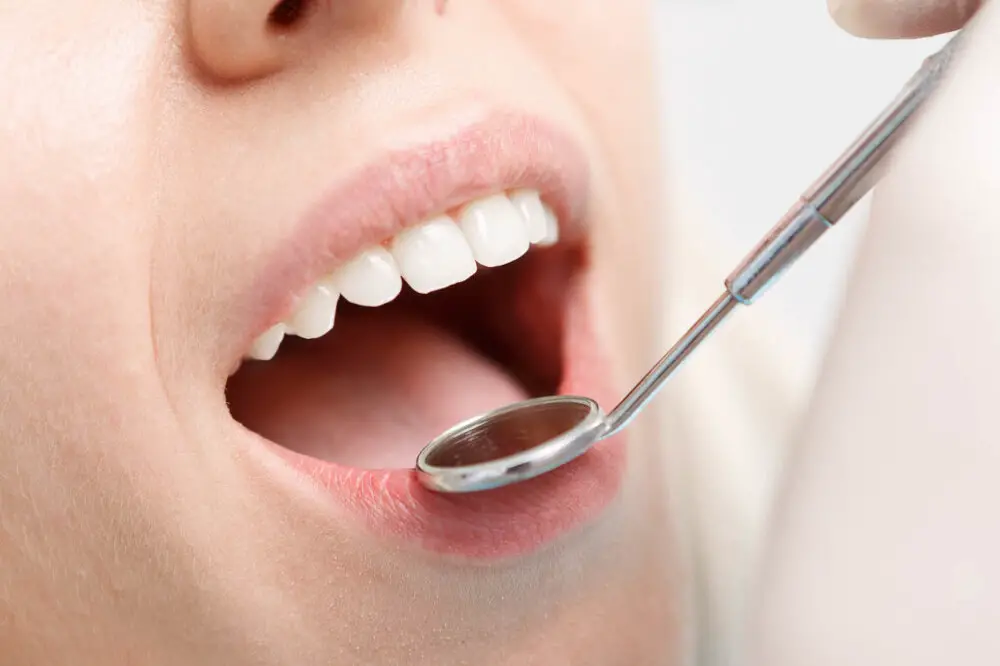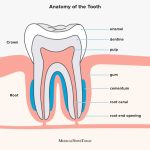Why Do Sweets Cause Tooth Pain: Understanding Tooth Sensitivity

Tooth sensitivity is a common dental problem that affects millions of people worldwide. It is characterized by a sharp, sudden pain that occurs when the teeth are exposed to hot, cold, sweet, or acidic foods and drinks. One of the most common triggers of tooth sensitivity is sweets, which can cause excruciating pain and discomfort for some individuals. Understanding why sweets cause tooth pain is essential for preventing and managing tooth sensitivity, which can significantly impact a person’s quality of life. Tooth sensitivity occurs when the protective layer of enamel on the teeth becomes worn down or damaged, exposing the underlying dentin layer. Dentin contains tiny tubes that connect to the nerves in the pulp of the tooth, making it sensitive to outside stimuli. When sweet substances come into contact with these tubes, they can cause a rapid and intense pain response that can last for several seconds or even minutes. This is because sugar is highly acidic and can dissolve the protective enamel layer, making the dentin layer more susceptible to external stimuli. In the following paragraphs, we will delve deeper into the causes and prevention of tooth sensitivity, with a focus on sweet foods and drinks.
Tooth sensitivity is a common dental problem that affects a significant proportion of the population. It is characterized by a sharp, often intense pain or discomfort in the teeth when exposed to certain stimuli, such as cold or hot temperatures, sweet or sour foods, or even just brushing or flossing. The underlying cause of tooth sensitivity is the exposure of the dentin, the soft tissue inside the tooth, to external stimuli due to the erosion of the tooth enamel or the recession of the gums. This can be caused by a variety of factors, including poor oral hygiene, gum disease, teeth grinding, acidic foods and drinks, and even genetics. Tooth sensitivity can significantly impact a person’s quality of life, making it difficult to enjoy certain foods and beverages, and causing discomfort during everyday activities such as brushing and flossing.
Sweets and tooth pain have an undeniable link, and understanding the reason behind this is crucial to maintain healthy teeth. Consuming sugary foods and drinks can result in tooth decay due to the reaction of the bacteria in the mouth with the sugars, leading to the production of acids that can erode the enamel. As the enamel wears away, the sensitive inner layers of the teeth become exposed, leading to pain and discomfort. This is why regular dental checkups and proper oral hygiene practices, such as brushing and flossing, are essential to prevent tooth decay and tooth sensitivity. Cutting down on sugary foods and drinks can also help reduce the risk of tooth pain and sensitivity.
Anatomy of a Tooth

Understanding the anatomy of a tooth is crucial to understanding tooth sensitivity and why sweets can cause tooth pain. A tooth consists of several layers, each with its own purpose. The outermost layer, called the enamel, is the hardest and most visible part of the tooth. The enamel protects the inner layers of the tooth from damage and decay caused by bacteria, acid, and other harmful substances. Beneath the enamel is the dentin, a layer of tissue that makes up the majority of the tooth. The dentin contains tiny tubes that lead to the innermost layer of the tooth, the pulp. The pulp is where the blood vessels and nerves of the tooth are located. When the enamel is damaged or worn away, the dentin and pulp become exposed, leading to tooth sensitivity and pain. When we eat sugary or acidic foods, the bacteria in our mouths produce acid that can erode the enamel of our teeth. This erosion can lead to cavities, gum disease, and tooth sensitivity. Additionally, the acid can penetrate the dentin and reach the pulp, causing further pain and discomfort. It’s important to practice good oral hygiene, such as brushing and flossing regularly, to prevent the buildup of harmful bacteria and reduce the risk of tooth decay. Additionally, limiting the intake of sugary and acidic foods and drinks can help preserve the enamel and reduce tooth sensitivity. Understanding the anatomy of a tooth and how it relates to tooth sensitivity can help individuals make informed decisions about their oral health and prevent tooth pain in the future.
The tooth is composed of several layers that contribute to its structure and function. The outermost layer is the enamel, which is the hardest and most mineralized tissue in the body. Beneath the enamel lies the dentin, a porous layer that contains microscopic tubules that lead to the tooth’s nerve center. The pulp, located at the center of the tooth, is composed of blood vessels, nerves, and connective tissue. The cementum is the layer of tissue that covers the root of the tooth and attaches it to the jawbone. These layers work together to provide strength and protection to the tooth, but they can also be affected by various factors that can lead to tooth sensitivity and pain.
Tooth sensitivity is a common oral health problem that occurs when the protective layer of the tooth, known as enamel, wears down or recedes, exposing the underlying dentin layer. The dentin layer contains tiny tubules that lead to the tooth’s nerve endings, which become exposed to external stimuli, such as hot, cold, sweet, or acidic foods and drinks. When these stimuli come into contact with the nerve endings, they trigger a pain response, causing discomfort or even sharp pain. Additionally, other factors such as gum disease, teeth grinding, and aggressive brushing can also contribute to tooth sensitivity by wearing down the enamel layer or causing gum recession.
Causes of Tooth Sensitivity

Tooth sensitivity is a common dental problem that can cause discomfort and pain in the teeth. The primary cause of tooth sensitivity is the exposure of the tooth’s dentin, which is the layer beneath the tooth enamel. When the dentin is exposed, it leads to sensitivity to hot and cold temperatures, sweet and sour foods, and sweet drinks. The most common causes of tooth sensitivity include tooth decay, gum recession, cracked teeth, and teeth grinding. Tooth decay occurs when bacteria in the mouth produce acid that erodes the tooth enamel. When the enamel is compromised, it exposes the dentin, leading to tooth sensitivity. Gum recession can also cause tooth sensitivity as it exposes the roots of the teeth, which are not protected by enamel. Cracked teeth can also cause tooth sensitivity as they expose the dentin. Teeth grinding can also lead to tooth sensitivity by wearing down the enamel and exposing the dentin. Another cause of tooth sensitivity is the consumption of acidic foods and drinks. Acidic foods and drinks can erode the tooth enamel and expose the dentin. Some of the most acidic foods and drinks include citrus fruits, tomatoes, pickles, and soda. Poor dental hygiene can also cause tooth sensitivity. When teeth are not brushed and flossed regularly, bacteria can accumulate in the mouth, leading to tooth decay and gum disease. Tooth sensitivity can also be caused by teeth whitening treatments, especially if they are overused or used incorrectly. Finally, certain medical conditions, such as acid reflux, can cause tooth sensitivity by exposing the teeth to stomach acid. Understanding the causes of tooth sensitivity is essential in preventing and treating this dental problem.
Tooth sensitivity is a common dental problem that can cause discomfort and pain when eating or drinking hot, cold, acidic, or sweet foods and beverages. The most common causes of tooth sensitivity include enamel erosion, gum recession, tooth decay, cracked or chipped teeth, and tooth grinding. Enamel erosion and gum recession can expose the underlying dentin layer, which contains microscopic tubules that connect to the nerves of the tooth, causing sensitivity. Tooth decay, cracks, and chips can also expose the dentin layer and cause sensitivity. Tooth grinding can wear down the enamel and expose the dentin, leading to sensitivity. Other factors that can contribute to tooth sensitivity include acidic foods and drinks, tooth whitening products, and certain dental procedures.
Sugar is a common culprit when it comes to tooth pain and sensitivity. When you consume sugary foods and drinks, the bacteria in your mouth use the sugar as fuel, producing acid as a byproduct. This acid can erode the enamel on your teeth over time, leading to tooth decay and sensitivity. Additionally, consuming sugary foods and drinks can cause a sudden spike in blood sugar levels, which can lead to inflammation and irritation of the gums. This inflammation can cause the gums to pull away from the teeth, exposing the sensitive roots and nerves underneath. To prevent tooth pain and sensitivity, it’s important to limit your intake of sugary foods and drinks, practice good oral hygiene, and visit your dentist regularly for checkups and cleanings.
Prevention and Treatment

Prevention and treatment are key factors in managing tooth sensitivity caused by consuming sweets. The first step towards prevention is maintaining good oral hygiene. Brushing your teeth twice a day with fluoride toothpaste and flossing daily can prevent the buildup of plaque and tartar, which can contribute to tooth decay and sensitivity. Additionally, using a mouthwash that contains fluoride can help strengthen tooth enamel and decrease sensitivity. Another preventative measure is to limit the consumption of sugary foods and drinks, especially those that are acidic. This reduces the risk of tooth decay and erosion, which can lead to sensitivity. When it comes to treatment, there are several options available depending on the severity of the tooth sensitivity. For mild cases, using desensitizing toothpaste can provide relief by blocking the pain signals sent by the nerves in the teeth. Applying fluoride gel or varnish to the affected teeth can also help strengthen tooth enamel and reduce sensitivity. In more severe cases, dental procedures such as bonding, crowns, or inlays can be performed to cover exposed tooth roots and reduce sensitivity. It is important to consult with a dentist to determine the best course of treatment for your specific case of tooth sensitivity.
Tooth sensitivity can be a very uncomfortable and painful experience, especially when eating sweets. However, by adopting certain strategies, it’s possible to prevent or reduce tooth sensitivity. One effective method is to maintain good oral hygiene, including brushing and flossing regularly, and using a fluoride toothpaste. Another strategy is to avoid consuming highly acidic foods and drinks, which can weaken tooth enamel and increase sensitivity. Additionally, using a soft-bristled toothbrush and avoiding aggressive brushing can also help prevent tooth sensitivity. Finally, regular dental checkups and cleanings can help detect and address any potential dental issues before they develop into more serious problems. By adopting these strategies, it’s possible to reduce tooth sensitivity and enjoy a pain-free smile.
Tooth sensitivity can be a frustrating and painful experience. Fortunately, there are several treatment options available to help alleviate the discomfort. One of the most common treatments is the use of desensitizing toothpaste, which contains compounds that block the nerve signals that cause sensitivity. Another option is the application of fluoride varnish or gel to the affected teeth, which can help strengthen the enamel and reduce sensitivity. In severe cases, a dentist may recommend a filling, crown, or root canal to address underlying issues that are causing the sensitivity. Overall, it is important to speak with a dentist to determine the best treatment plan for individual needs and to maintain good oral hygiene practices to prevent future sensitivity.
Importance of Dental Care

Dental care plays a vital role in maintaining overall health. Proper dental hygiene can prevent various oral problems, including tooth decay, gum diseases, and tooth sensitivity. Ignoring dental care can lead to severe dental problems that can be painful and costly to treat. The primary goal of dental care is to prevent dental issues from occurring in the first place. Regular brushing, flossing, and routine dental check-ups can detect and treat dental problems early on, preventing them from becoming more severe. Tooth sensitivity is a common dental issue that affects many people. It occurs when the tooth’s enamel wears down, exposing the sensitive dentin layer underneath. Consuming sugary or acidic foods and drinks can exacerbate tooth sensitivity, causing pain and discomfort. That’s why it’s essential to maintain proper dental hygiene to prevent tooth sensitivity. Brushing with fluoride toothpaste, flossing regularly, and avoiding sugary and acidic foods and drinks can help prevent tooth sensitivity. It’s also essential to visit a dentist regularly for check-ups and cleanings to ensure that any dental issues are detected and treated early on. By taking care of your teeth and gums, you can prevent dental problems and maintain good oral health.
Regular dental checkups are crucial for maintaining good oral health. The importance of these visits lies in the fact that they allow dentists to identify and address any dental issues before they become major problems. During a checkup, dentists can perform a thorough cleaning of the teeth and gums, check for signs of decay or infection, and provide guidance on proper oral hygiene practices. Additionally, dentists can identify any signs of tooth sensitivity, which is a common problem caused by consuming sugary foods and drinks. By identifying tooth sensitivity early, dentists can provide treatment options to help alleviate the pain and discomfort associated with this condition. Therefore, it is important to schedule regular dental checkups to keep your teeth and gums healthy and avoid any potential dental problems.
Proper dental care plays a significant role in preventing tooth sensitivity. One of the most effective ways to prevent tooth sensitivity is to maintain good oral hygiene. Brushing your teeth twice a day and flossing regularly helps to remove plaque and tartar buildup, which can cause tooth sensitivity. In addition, using a toothpaste that contains fluoride can help to strengthen your tooth enamel and decrease sensitivity. It is also essential to avoid consuming acidic foods and drinks, such as citrus fruits and soda, as they can erode the tooth enamel. Regular dental check-ups and cleanings can help identify and treat any dental issues that can lead to tooth pain and sensitivity. By following these simple dental care practices, you can prevent tooth sensitivity and maintain good oral health.
In summary, tooth sensitivity is a common problem that affects millions of people worldwide. It is caused by the exposure of the underlying dentin layer of the teeth, which contains tiny nerve endings that send pain signals to the brain. Sweets and sugary foods are a common trigger of tooth pain, as they can cause the dentin to become more porous and sensitive. Other factors that can contribute to tooth sensitivity include brushing too hard, gum disease, and teeth grinding. Luckily, there are several effective treatments available, such as desensitizing toothpaste, fluoride treatments, and dental sealants, which can help to alleviate the symptoms of tooth sensitivity and protect the teeth from further damage.
It’s time to take charge of your dental health and prioritize regular dental check-ups and reducing your sugar intake. Tooth sensitivity caused by sweets is a common issue that can lead to severe pain, discomfort, and even tooth decay. By taking simple steps, such as brushing your teeth twice a day, flossing regularly, and visiting your dentist at least twice a year, you can prevent tooth sensitivity and maintain a healthy smile. Additionally, reducing your sugar intake can significantly decrease the risk of cavities and tooth decay. Make a conscious effort to choose healthier snacks, limit your intake of sugary beverages, and practice good oral hygiene to keep your teeth and gums healthy for years to come. Remember, prevention is always better than cure, so start prioritizing your dental care today!
Conclusion

In conclusion, tooth sensitivity caused by the consumption of sweets is a common issue that affects many individuals. The enamel of our teeth acts as a protective layer, and when it wears away, the underlying dentin is exposed, resulting in sensitivity. The acids and sugars in sweets can accelerate the process of enamel erosion, leading to tooth pain. It is essential to maintain good oral hygiene habits, such as brushing and flossing, and limiting the consumption of sugary foods and drinks to prevent tooth sensitivity. Visiting a dentist regularly can also help identify any underlying dental issues and provide appropriate treatment. By understanding the causes of tooth sensitivity, we can take steps to protect our teeth and enjoy our favorite sweets without any discomfort.







